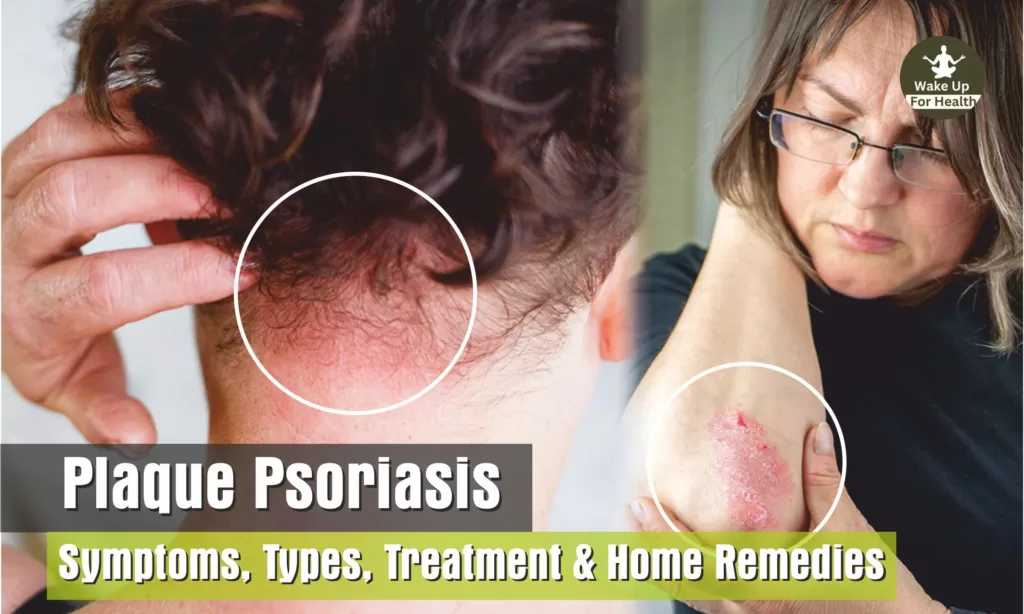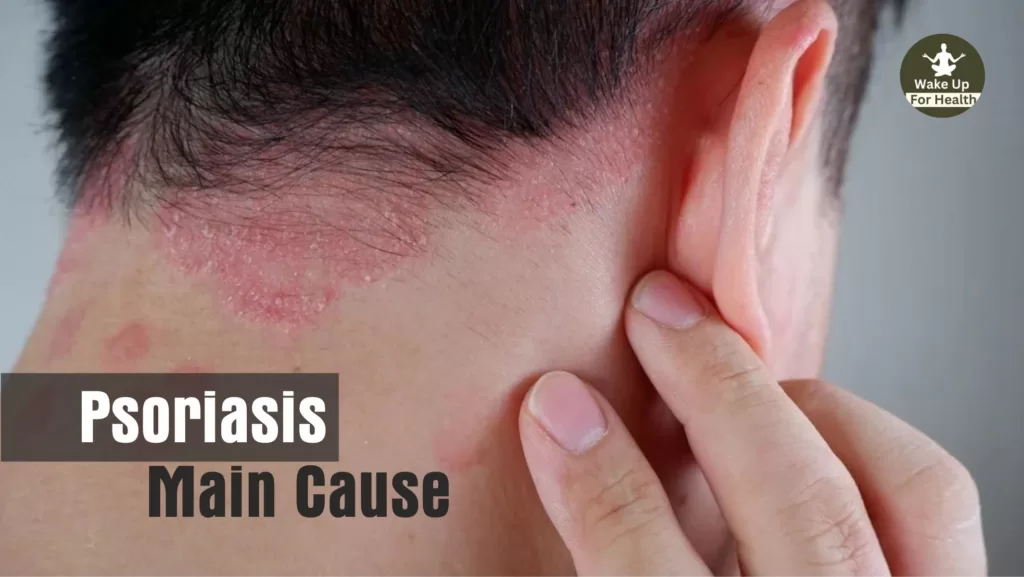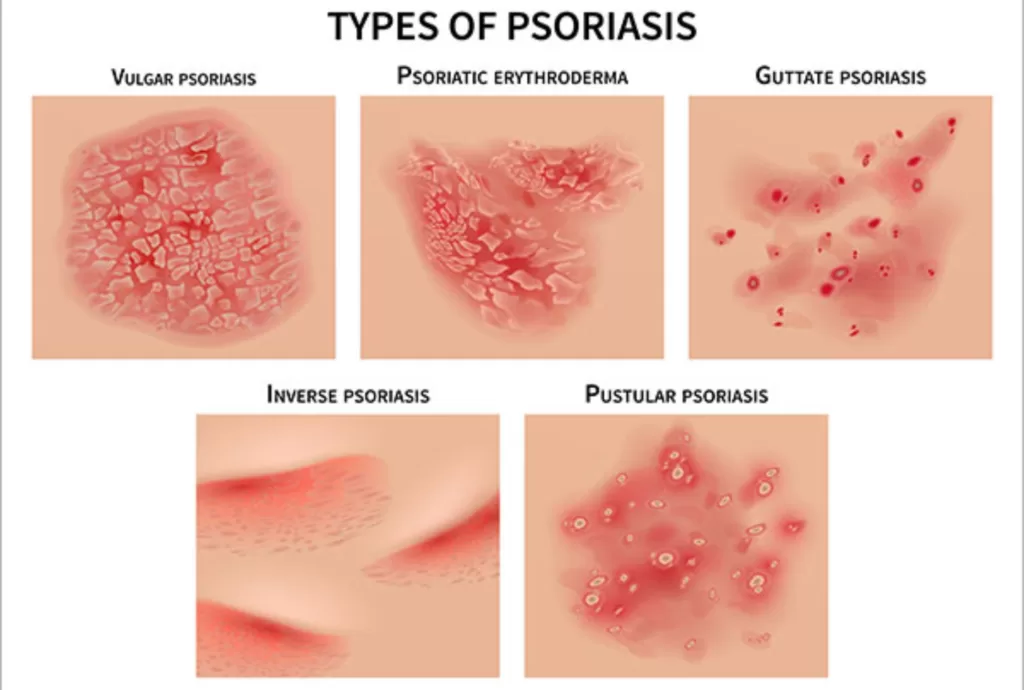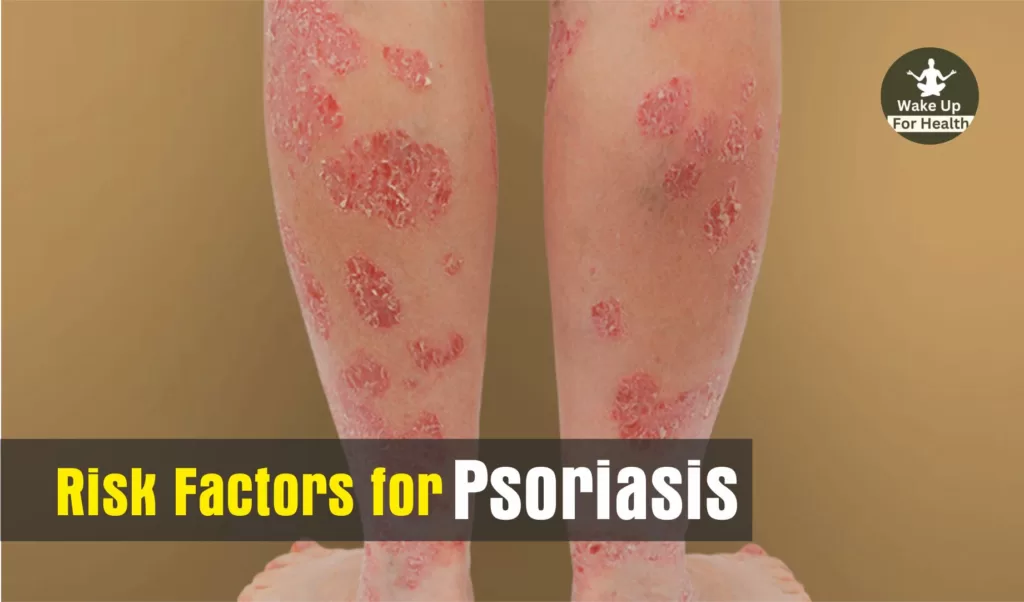- Plaque Psoriasis is a chronic autoimmune skin condition that causes the rapid buildup of skin cells. It results in thick, scaly patches or plaques on the skin’s surface.
- Psoriasis is a non-contagious condition that can vary in severity, ranging from mild and localized to severe and widespread.
Psoriasis is a skin condition in which skin cells grow at an abnormal level. Usually, cell regeneration occurs and balances out with the dead skin cells. As skin cells begin to grow abnormally, they rise to the top of your skin and die, leaving behind a red plaque covered with white scales.
They usually occur on the knees, elbows and sometimes on your scalp. There are many reasons why skin cells behave abnormally. The usual reason is that they are linked to the way your immune system is performing. Here we will know more about Psoriasis Symptoms, Prevention, Diagnosis, Types, Treatment & Home Remedies.

The disease is characterized by: growing 10 times faster than the normal growth of skin cells. As the dead underlying cells reach the surface of the skin, their massive accumulation causes raised, red plaques that are covered with white scales. This disease usually occurs on the elbows, knees and scalp.
What are the Causes of Psoriasis?, Dealing with Plaque Psoriasis
The exact cause of this skin condition is not known but there can be many other factors which can lead to psoriasis.
1. Immune System
Our immune system helps to keep us safe from virus and bacterial infections but if something goes wrong, our system starts doing the opposite. Researchers believe that one of the causes of this skin condition is the immune system. When our immune system is working overactive, it creates inflammation inside the body.
A large number of healthy cells are formed. Then these extra cells start coming to the surface of the skin very quickly. This accumulation of skin cells that you see on your skin is psoriasis. It is red in color and causes swelling in the skin.
2. Hormonal changes
During puberty or menopause, this problem can be seen on the skin. You are more prone to develop psoriasis if you are pregnant. Once the delivery is complete, you may once more see it on the skin’s surface.
3. Alcohol
The risk is higher in people who regularly drink alcohol, especially young men. It should also be mentioned that alcohol also makes the treatment less effective.
4. Medicines
Certain drugs like lithium (which treats bipolar disorder and mental illness), high blood pressure drugs (including propranolol, beta-blockers, ACE inhibitors, quinidine), anti-malarial drugs (chloroquine, hydroxychloroquine, plaquenil and (including quinacrine) may increase susceptibility to psoriasis.
5. HIV
Patients suffering from HIV are more at risk of getting psoriasis. But, as soon as you start HIV treatment, you will feel better.
6. Sunlight
A little sunlight is good for health as it provides natural Vitamin D to the body. But sometimes, sunburn can make the condition worse, so it is advised to take proper care of your skin before stepping out in the sun.
What is the Main Cause of Psoriasis?, Identifying Symptoms, Treatment Strategies
This skin condition is an autoimmune disease. The exact cause of the phenomenon is still under research. However, the two main causes of the skin disorder include:

1. Genetic Predisposition
This skin condition is not directly inherited, but shows a genetic predisposition. It has been discovered to have an impact on several members of the same family.
2. Environmental Factors
In some cases, environmental factors in combination with genetic defects are responsible for causing this skin condition in a person. These genetic defects adversely affect the immune system.
3. Beta-Blockers
Medications like beta-blockers are also associated with psoriasis in some cases.
What are the Different Types of Psoriasis?

This skin condition can be caused by a number of reasons, from trauma to emotional stress to streptococcal infection. A recent study of this disease has indicated that some abnormalities in the immune system are the factors that trigger this disease. There are five different types of psoriasis:
1. Plaque Psoriasis
This is a type of psoriasis that gives red, raised patches on the skin. These are covered with silver dead skin cells.
2. Guttate Psoriasis
Guttate psoriasis is a type of psoriasis characterized by small, drop-like lesions that appear on the skin. The word “guttate” comes from the Latin word “gutta,” meaning “drop.” It is one of the various forms of psoriasis and is more commonly seen in children and young adults, though it can occur at any age. In Guttate Psoriasis patient get small red spots on the skin. This occurs following the patient’s illness.
3. Inverse Psoriasis
Inverse psoriasis, also known as flexural psoriasis or intertriginous psoriasis, is a type of psoriasis that occurs in the folds and creases of the skin. It is called “inverse Psoriasis” because it appears in areas where the skin rubs against itself, such as the armpits, groin, under the breasts, and in skin folds. This type of psoriasis usually occurs in skin folds. It causes pain and red spots on the skin.
4. Pustular Psoriasis
This type of skin condition causes pus filled areas on the palms and soles. These are painful and itchy at the same time. It results in flu-like symptoms like fever, lightheadedness, and appetite loss, among others.
5. Erythrodermic Psoriasis
This resembles a severe sunburn as it makes the skin bright red. In this type of psoriasis that causes rapid heart rate, itching and pain. It should be mentioned that this is an emergency which should consult a doctor.
Also read: Acne Prone Skin: Symptoms, Types of Acne, Diagnosis & 9 Treatment
What are the Symptoms of Psoriasis?
1) Swollen and red patches of skin that are covered with silvery, loose scales. They can be painful, itchy and sometimes crack and bleed.
2) Fingernails and toenails may discolor and change color. They may also begin to flake off or separate from the root of the nail.
3) Patients with this kind of skin condition may develop scales and spots or crusts on their scalp.
How to Diagnose Psoriasis?
Your Doctor can check to see if you have psoriasis or if you have plaques on your ears, nails, elbows, scalp, belly button, and knees. If the doctor is still unclear, he or she will take a small sample of your skin, known as a biopsy.
Afterward, it will be sent to a lab and your skin sample will be examined under a microscope. This will make it clear what type of Psoriasis you have or what type of infection or disease you are suffering from.
Which is the Best Treatment for Psoriasis?
This skin condition cannot be cured but it can be treated to control the symptoms. Some of the important methods of treatment include the following:
1. Application of Topical Steroids
These are available in the form of ointments, creams, gels, lotions, shampoos and sprays. These should be used under the supervision of a dermatologist. Corticosteroids are the key components that effectively control symptoms and prevent flare-ups.
2. Light Therapy
When psoriasis is moderate or severe, this is the first course of treatment. Exposing the red, itchy patch to a certain light leads to shrinkage or disappearance of the same.
3. Application of Some other Topical Treatments
These include topical application of vitamin D analogues, salicylic acid, retinoids, calcineurin inhibitors, anthralin and coal tar.
4. Steroid Shots
Steroid shots are given directly into the inflamed patch of skin. These are preferred in cases of stubborn inflamed skin patches.
5. Use Suppressants
These include taking immunosuppressants such as cyclosporine.
What to do if you have Psoriasis?
There are steps we can take to control and manage the condition of psoriasis. They include:
1. Topical Therapy
Includes application of corticosteroids, retinoids, vitamin D analogs, salicylic acid, coal tar, and anthralin to affected areas of the skin.
2. Phototherapy
Involves exposure of affected skin areas to natural or artificial light such as sunlight, UVB therapy, and excimer laser.
3. Oral or Injectable Drugs
This includes steroids, retinoids, cyclosporine, methotrexate, biologics, and drugs such as tabloids and hydroxyurea.
4. Implementation of Stress Reduction Therapy
What are the Risk Factors For Psoriasis?

This skin condition manifests symptoms that are connected to skin inflammation. These include the appearance of thick and dry scaly patches (dry scaly patches) on the same skin. Such symptoms are similar to some other skin diseases which include the following:
- Itching (Eczema)
- Seborrheic Dermatitis
- Allergic contact Dermatitis (Allergic Contact Dermatitis)
- Hives
- Keratosis Pilaris (Keratosis Pilaris)
- Shingles
- Skin Cancer
- Pityriasis Rosea
Can Psoriasis be Cured Forever?
This skin condition is an autoimmune disease of the skin, so no cure is yet known. The only treatment possible for this inflammatory skin condition is to control and manage the symptoms and prevent flare-ups. It is a chronic and lifelong condition that can go through remission.
Preventions for Psoriasis?
Psoriasis is a skin disease and a dermatologist should be consulted for its treatment. However, there are some home remedies that may prove effective for the prevention and management of the condition. Some of those treatments include:
- Use moisturizing lotion on the skin regularly to prevent drying of the skin.
- Proper care of the skin and scalp should be taken which includes use of medicated shampoos on the scalp and regular bathing with medicated products.
- Exposure to cold as well as dry weather should be avoided, a humidifier can be used indoors.
- Prescribed drugs should be given priority.
- Stress should be avoided.
What to Eat?
A healthy diet is always important for maintaining healthy skin and fighting flare-ups related to any skin disease. Some of the food habits that should be preferred in case of this skin condition to control the severity of symptoms are as follows:
- Avoiding excessive consumption of alcohol.
- Include anti-inflammatory foods in the diet such as fruits and vegetables including berries and green leafy vegetables.
- Sources of healthy fats such as olive oil, seeds and nuts.
- Consumption of omega-3 fatty acids.
- Sources of antioxidants like cumin and ginger.
- Low carbohydrate and low fat diet should be taken.
- A gluten-free diet is preferred.
What should not be Eaten if having Psoriasis?
Since diet plays an important role in maintaining healthy skin, it is always important for us to know about the foods that have a negative effect on the skin, especially in cases of skin diseases like psoriasis. Those foods are as follows:
- High-carbs diet
- High-fat diet
- Foods high in sugar content
- Red meat
- Processed and junk food
- Dairy products
- Gluten-rich diet
- Excessive alcohol
Disclaimer : The article’s sole purpose is to wake you up for your health and to provide you the best collective and verified information. We do not recommend for any kind of medicine or treatment. You should only seek to your Doctor or Medical Counselor Because there is no one better than him.